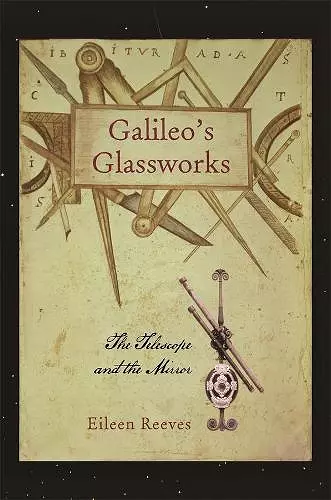Galileo’s Glassworks
The Telescope and the Mirror
Format:Hardback
Publisher:Harvard University Press
Published:1st Mar '08
Currently unavailable, and unfortunately no date known when it will be back

The Dutch telescope and the Italian scientist Galileo have long enjoyed a durable connection in the popular mind--so much so that it seems this simple glass instrument transformed a rather modest middle-aged scholar into the bold icon of the Copernican Revolution. And yet the extraordinary speed with which the telescope changed the course of Galileo's life and early modern astronomy obscures the astronomer's own curiously delayed encounter with the instrument. This book considers the lapse between the telescope's creation in The Hague in 1608 and Galileo's alleged acquaintance with such news ten months later. In an inquiry into scientific and cultural history, Eileen Reeves explores two fundamental questions of intellectual accountability: what did Galileo know of the invention of the telescope, and when did he know it?
The record suggests that Galileo, like several of his peers, initially misunderstood the basic design of the telescope. In seeking to explain the gap between the telescope's emergence and the alleged date of the astronomer's acquaintance with it, Reeves explores how and why information about the telescope was transmitted, suppressed, or misconstrued in the process. Her revised version of events, rejecting the usual explanations of silence and idleness, is a revealing account of the role that misprision, error, and preconception play in the advancement of science.
Along the way, Reeves offers a revised chronology of Galileo's life in a critical period and, more generally, shows how documents typically outside the scope of early modern natural philosophy--medieval romances, travel literature, and idle speculations--relate to two crucial events in the history of science.
Reeves’s splendid account is a cultural and social history that sets Galileo’s telescope in the rich landscape of optical science from the Middle Ages to the modern period. -- Simon Mitton * Times Higher Education Supplement *
Fascinating… Eileen Reeves shows just how tangled with myth and legend the history of the telescope, and Galileo’s pioneering use of it, actually was… Ms. Reeves recounts this complicated history with great flair. She is more interested in the missteps and the stumbles that accompanied momentous discoveries than in their scientific significance, and rightly so. The tale of Galileo’s telescope is, as it turns out, an intensely human one. Sometimes, amid the intrigue and the campaigns of slander and distortion which surrounded Galileo’s discoveries, it seems as if the chief obstacle to a clear-sighted gaze at the heavens lay not in better optics but in piercing dense clouds of misconception. As Ms. Reeves shows, Galileo was no isolated genius; he built on the scattered findings of his predecessors. To certain contemporaries, he appeared as a modern Prometheus, but he was also a shrewd operator, as ambitious as he was inquisitive. There was something both sublime and stubborn in his nosiness, yet in the end it led him to the stars. -- Eric Ormsby * New York Sun *
Scattered with intriguing nuggets. * Kirkus Reviews *
In Galileo’s time, [Reeves] reports, many scientists and amateurs were experimenting with optics and purloining each other’s results in a complex game of cross-national thievery. Reeves’s study is a skillful interpretative blend of legend, history and science about lenses, mirrors and their conjoining in the telescope. * Publishers Weekly *
Eileen Reeves’s book provides us with a significant effort for a better understanding of the cultural features involved in the making of the telescope. Highly original and innovative, Galileo’s Glassworks paves the way for further inquiries that will deepen our knowledge of the relationship between well-established cultural models and technological innovations. -- Michele Camerota, Professor of the History of Science, University of Cagliari
The telescope was ‘invented’ in 1608. But what about the events leading up to it? Galileo and his contemporaries were searching for a device with which ‘from an incredible distance we might read the smallest letters.’ Eileen Reeves tells a story of ‘cultural optics’: magical mirrors and political intrigue, and investigators looking for magnifying power in all the wrong places, while the solution lay in the humble spectacle lenses on their noses. An excellent read, and an important contribution to the history of science. -- Albert van Helden, Lynette S. Autrey Professor of History, Rice University
- Nominated for Rachel Carson Prize & Ludwik Fleck Prize 2009
ISBN: 9780674026674
Dimensions: unknown
Weight: unknown
240 pages